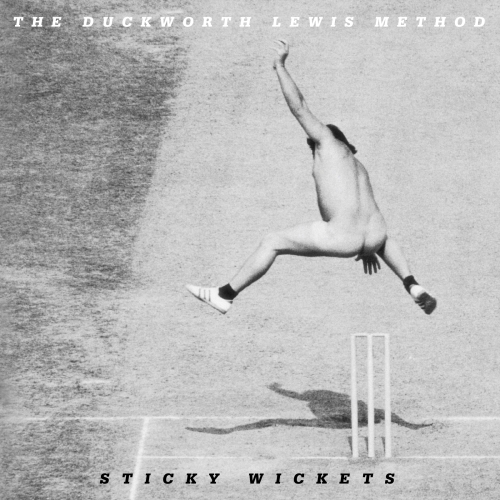On paper, a band and album created around the concept of cricket has the sound of something rather niche, hardly universal, and perhaps a little tongue-in-cheek. Clearly their love of the game was very genuine but the greatest thing about The Duckworth Lewis Method was its ability to truly strike a chord beyond the boundary of the cricket field with brilliantly crafted, clever pop songs that were accessible to anyone whether or not they knew their LBW from a googly. This applies even more on the band’s second inning, Sticky Wickets.
It’s quite a challenge for Hannon and Walsh to come back with fresh ideas after pouring what appeared to be every ounce of cricketing history and folklore into their debut. The result, I’m sure, of many a conversation over the years that finally came to fruition, they left very little behind. So while cricket once again serves as the catalyst for the themes of Sticky Wickets, it is far less explicit – well, except possibly for the out of the blue 80s synth-pop meets INXS of ‘Line and Length’ where "the corridor of uncertainly" has never sounded quite so alluring.
The opening track ‘Sticky Wickets’ is a pretty direct 70s style prog-rocker with plenty of cowbell. Sung mainly in a falsetto, it’s a pretty rousing return with some killer percussion fills and all round rock & roll excitement. When listened to out of context or outside of the cricketing commonwealth however the song could just as easily be received as an uplifting call to arms as Walsh and Hannon tell us to "stand up and fight".
It’s not really until the third song and lead single from the record ‘It’s Just Not Cricket’, a fun, colloquial celebration of the gentleman’s game (featuring the impossibly posh voice of radio commentator Henry Blofeld), that the casual listener would grasp exactly what is going on here.
And really it is the songs that find a greater depth that make this collaboration so special. Neil Hannon has always been a terrifically clever observational lyricist and character builder, and he is in good form here especially on two of the albums key tracks, ‘The Umpire’ and ‘Judd’s Paradox’.
‘The Umpire’ is a melancholic ballad where Hannon paints the character’s sense of alienation from the players and crowd through a more universal theme of generational divide. The umpire dreams of a simple holiday by the sea with "candy floss" and "penny arcades" away from those that see him as "a relic from yesteryear". He lives in England’s simple past cut off from technological advances (he drives a 1955 Escort while "the Jags and Ferraris leave me in their wake again.") With a simple arrangement of piano, drums and strings along with some marvellous and moving vocal harmonies, it is equal parts pop song and show tune – a bit of a Hannon speciality.
In a similar vein, though a little more epic, ‘Judd’s Paradox’ is a tale of conflict between the joy of playing the game and colonial guilt. A guest appearance by Stephen Fry’s forthright tones is perfect as he recites a poem before Hannon and Walsh sing each chorus. It’s a more brooding, cricketing version of something like Blur’s ‘Ernold Same’. The track is filled with both drama and contemplation where the central character is torn between a love of the game and wondering why he might be playing it in the far flung places of the Victorian Empire. "I should be incensed by what it represents and yet it’s a damn good game" says Fry, and here lies the paradox.
These more serious moments aside, Sticky Wickets is, as you might suspect, a lot of fun too. ‘Third Man’ is probably the most instant and catchy song here with an irresistible chorus and a cameo by Daniel Radcliffe; ‘The Laughing Cavaliers’ is simply an old-fashioned drinking song with melody aplenty and deceptively well crafted harmonies while ‘Boom Boom Afridi’ finds rhythmic and thematic influences from India. The swinging ‘Mystery Man’ also provides a stage for Matt Berry to make a guest appearance. Musically, things never stay in one place, so you can forgive them the slightly plodding verses to lounge effort ‘Out In The Middle’. In the scheme of the record, however, it works by providing a sharp contrast with the aforementioned brash synth pop of ‘Line And Length’.
"We don’t want to be superstars/’Cause that’s not really who we are" they sing on the chorus to album closer ‘Nudging and Nurdling’, a song that champions a hard working, stubbornly effective batsman who never grabs the headlines. It could also be seen as a hidden referral to the main players of the album themselves.
Sticky Wickets dispels any thoughts or concerns that this is merely a novelty act and while not as instant as their debut, repeated listens definitely provide equal rewards. Well played, chaps.


